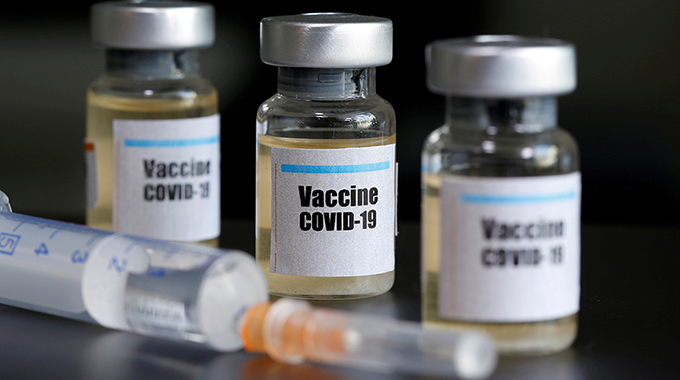Is the Covid vaccine safe?

Michelle Robert
How do we know a vaccine is safe?
This is the first and most important question scientists ask when they start designing and testing a new vaccine or treatment.
Safety trials begin in the lab, with tests and research on cells and animals, before moving on to human studies.
The principle is to start small and only ever move on to the next stage of testing if there are no outstanding safety concerns.
How will I get a coronavirus vaccine?
How does the Oxford vaccine compare?
Who will get the vaccine first and when can you have it?
Your Questions Answered: How do we know the vaccine is safe?
What role do trials have?
As long as the safety data from the labs is good, scientists can check that the vaccine or treatment is effective too.
That means tests on large numbers of volunteers – around 40,000 individuals in the case of Pfizer/BioNTech.
In trials, half of the people are given the vaccine and the other half a dummy or placebo jab. The researchers and participants are not told which group is which, until after the results have been analysed, to avoid bias.
All of the work and findings are checked and verified independently.
The Covid vaccine trials have happened at breakneck speed, but they haven’t skipped any of these steps.
The Oxford/AstraZeneca Covid vaccine trial was voluntarily put on hold at one stage to investigate why one participant – out of many thousands – had died. It restarted once it was clear it was not related to the vaccine.
Who approves vaccines or treatments?
Approval will only be given for a vaccine if the government regulator, the Medicines & Healthcare products Regulatory Agency (MHRA), is happy that it’s both safe and effective.
The MHRA is part of the Department of Health, and employs more than 1,200 people. Its head is Dr June Raine, who has spent her career working in medicine regulation.
In becoming the first agency in the world to approve a coronavirus vaccine, Dr Raine said: “The public can be absolutely confident that the standards we have worked to are equivalent to those around the world”.
Checks on the vaccine will continue to make sure there are no further side effects or long-term risks.
If anyone suspects they are suffering a side effect from a vaccination, they can report it to the MHRA.
Independent experts on the Joint Committee on Vaccination and Immunisation decide how best to use a vaccine and who should get it first
It has drawn up interim advice on priority groups for the Covid vaccine and how many doses to use.
The JCVI, which has about 20 members who are experts on vaccines, is led by Prof Andrew Pollard, who works at the University of Oxford.
What’s in the Covid vaccines?
There are lots of different Covid vaccines in development.
Some contain the pandemic virus itself in a weakened form.
The Oxford AstraZeneca vaccine uses a harmless virus altered to look a lot more like Sars-CoV-2 – the virus that causes Covid-19.
Pfizer/BioNTech and Moderna’s vaccines use bits of genetic code to cause an immune response, and are called mRNA vaccines.
These do not alter human cells. They only present the body with instructions to build immunity to Covid.
Some Covid jabs contain proteins from coronavirus.
Vaccines sometimes contain other ingredients, like aluminium, that make the vaccine stable or more effective.
Will a vaccine make me ill?
There is no evidence that any of these ingredients cause harm when used in such small amounts. Vaccines do not give you a disease. Instead, they teach your body’s immune system to recognise and fight the infection they have been designed to protect against.
Some people do suffer mild symptoms, such as muscle aches or a bit of a temperature, after being vaccinated. This is not the disease itself, but the body’s response to the vaccine.
Allergic reactions to vaccines are rare. For any approved vaccine, the ingredients will be listed.
Prof Sir Munir Pirmohamed, who advises the MHRA, said it hadn’t identified any “serious adverse reactions” during the trial of the Pfizer/BioNTech vaccine.
He said: “Most of the adverse effects were mild and short-lasting, usually lasting for a day or two, similar to the kind of effects you get after any other vaccine”.
He added that the MHRA had a “vigilant” strategy to carry on monitoring the safety of the vaccine.
Is it safe for someone who had Covid to have the vaccine?
Once a coronavirus vaccine is approved, it is likely that people will still be offered the jab even if they have had Covid-19 in the past. That’s because natural immunity may not be long-lived and immunisation could offer more protection.
Guidance from Public Health England says there are no safety concerns about giving jabs to people with long Covid either. But people who are currently unwell with Covid-19 should not receive the vaccine until they have recovered.
How animal-friendly are vaccines?
Some vaccines, such as the shingles vaccine and the children’s nasal flu vaccine, can contain pork gelatine. And some vaccines are grown on hen’s eggs, or cells from chick embryos.
There are hundreds of Covid vaccines in development. We don’t have details on every ingredient yet, but many of the Covid vaccines are expected to be vegetarian or vegan friendly.
If everyone else gets vaccinated then surely I don’t need to bother?
There is overwhelming scientific evidence that vaccination is the best defence against serious infections.Covid vaccines appear to stop people getting very sick and could save lives.
The first doses that become available will probably be offered to people with the highest need – such as the elderly – who could become severely ill.It is not yet clear how much protection vaccines might give in terms of stopping people from spreading Covid.If they can do this well, vaccinating enough people would stamp out the disease. –SOURCE –bbc-news.







Comments